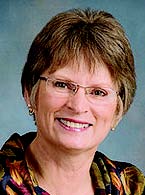Board to consider tuition increase

Sherry Buchanan
Today, Missouri Southern’s Board of Governors, chaired by Sherry Buchanan, will vote on a proposed 2.2 percent increase to tuition for the fall 2013 semester.
The proposed increase follows last year’s 4 percent increase and will amount to $3.72 per credit hour for Southern’s in-state rate. Under the increase, tuition would be bumped to $173.20 per credit hour from $169.48. The increase in MSSU’s out-of-state rate will amount to $7.44 per credit hour, making the toal $346.40.
The increase is based on an annual letter of notification the University receives based on Senate Bill 389 that restricts the amount institutions can increase their tuition and fees based on the Consumer Price Index (CPI), said Missouri Southern Treasurer Linda Eis.
This year the CPI rose 1.7 percent; however, Eis said that because Southern falls below the average cost for tuition in Missouri, it was able recommend an additional 2.2 percent increase.
Despite Southern’s recent troubles with enrollment and retention, Eis said she thinks an increase is necessary.
“It’s like everything else out there, prices are going up,” Eis said.
“This will help and assist that, but it really won’t cover all the cost of the operating costs that we have.”
Eis spoke with financial aid and found that full Pell grants will increase as well and students attending Southern should still be able to cover all of their tuition including any increase.
Eis reiterated a longtime University mindset that, “We kind of feel like we are the best value. The value for our education here is one of the lowest in the state.”
The 2.2 rate, as opposed to 1.7 percent, was proposed to help relieve rising operational costs the University faces.
“We have to look at a way to continue to provide services,” Eis said.
Eis said that while Southern is in no way operating at a deficit, there is a need to balance some of the expense the University has while keeping the increase small enough that it does not adversely affect students.
“We provide a lot of services to the students and those will continue to increase and so we are just looking for a way to be able offer services and everything we have,” Eis said.
Your donation will support the student journalists of Missouri Southern State University. Your contribution will allow us to purchase equipment and cover our annual website hosting costs.



























